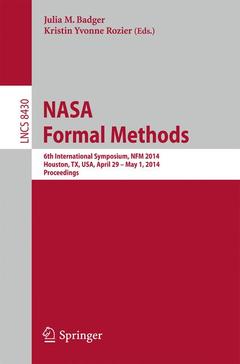Description
NASA Formal Methods, 2014
6th International Symposium, NFM 2014, Houston, TX, USA, April 29 - May 1, 2014. Proceedings
Programming and Software Engineering Series
Coordinators: Badger Julia M., Rozier Kristin Yvonne
Language: English
Subjects for NASA Formal Methods:
Publication date: 04-2014
360 p. · 15.5x23.5 cm · Paperback
360 p. · 15.5x23.5 cm · Paperback
Description
/li>Contents
/li>
This book constitutes the refereed proceedings of the 6th International Symposium on NASA Formal Methods, NFM 2014, held in Houston, TX, USA, April 29 ? May 1, 2014. The 20 revised regular papers presented together with 9 short papers were carefully reviewed and selected from 107 submissions. The topics include model checking, theorem proving, static analysis, model-based development, runtime monitoring, formal approaches to fault tolerance, applications of formal methods to aerospace systems, formal analysis of cyber-physical systems, including hybrid and embedded systems, formal methods in systems engineering, modeling, requirements and specifications, requirements generation, specification debugging, formal validation of specifications, use of formal methods in safety cases, use of formal methods in human-machine interaction analysis, formal methods for parallel hardware implementations, use of formal methods in automated software engineering and testing, correct-by-design, design for verification, and property based design techniques, techniques and algorithms for scaling formal methods, e.g., abstraction and symbolic methods, compositional techniques, parallel and distributed techniques, and application of formal methods to emerging technologies.
Model checking.- Theorem proving.- Static analysis.- Model-based development.- Runtime monitoring.- Formal approaches to fault tolerance.- Applications of formal methods to aerospace systems.- Formal analysis of cyber-physical systems, including hybrid and embedded systems.- Formal methods in systems engineering.- Modeling.- Requirements and specifications.- Requirements generation.- Specification debugging.- Formal validation of specifications.- Use of formal methods in safety cases.- Use of formal methods in human-machine interaction analysis.- Formal methods for parallel hardware implementations.- Use of formal methods in automated software engineering and testing.- Correct-by-design.- Design for verification, and property based design techniques.- Techniques and algorithms for scaling formal methods, e.g., abstraction and symbolic methods.- Compositional techniques.- Parallel and distributed techniques.- Application of formal methods to emerging technologies.
© 2024 LAVOISIER S.A.S.




